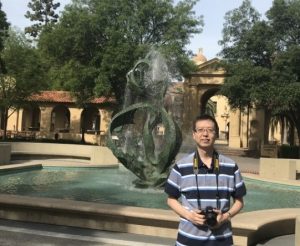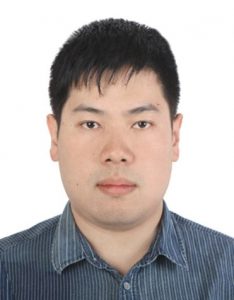Workshop 1 (Challenge)
竞赛主题:MOre than Common Object Detection (MOCOD) – Occlusion and Small Objects
竞赛内容:遮挡和小物体是物体检测任务的难点之一,尤其是在监控、自动驾驶和视觉感知的应用场景中。因此,本Workshop将举办遮挡图像识别和小物体检测的竞赛单元,以促进计算机视觉领域的发展。
主办方:
Huimin Ma, Tsinghua University
Yunzhi Xue, Institute of Software, Chinese Academy of Sciences
Qi Guo, Institute of Computing Technology, Chinese Academy of Sciences
Jianguo Cao, University of Science and Technology Beijing
时间节点:
参与者注册:2019年5月1日-7月30日
数据集发布时间:2019年5月5日
测试集发布:2019年8月1日
结果提交:2019年8月5日
优胜者代码提交:2019年8月12日
结果通知:2019年8月15日
报告和颁奖典礼:2019年8月25日
数据集概要:
小目标检测与遮挡检测为两个独立任务,别分使用独立的数据集进行训练和评测,具体评测原则以及提交程序与数据集一同发布。
小目标检测数据集提供了一组训练集和验证集,用于多种小目标的目标检测。该训练集和验证集共约12000张,是利用虚拟仿真技术生成的模拟无人机低空拍摄出的晴天、傍晚和雾条件下的城市交通小目标数据集,同时提高图像数据所对应的标签信息。
遮挡目标检测数据集包含了人、车、船、飞机四个大类,每类训练和验证集包含10张真实遮挡图像,50张多源仿真图像以及1000张同源仿真图像,测试集约500张(以实际数量为准,详见文档更新)。其中多源仿真图像指来自于各种游戏、仿真数据集等场景的遮挡图像,同源仿真图像为使用本实验室仿真平台生成的遮挡图像。数据集标注包含了图像中对应类别的全部物体,被遮挡物体的遮挡面积等信息。
报名方式及数据集下载:下载报名表后填写并发送至报名邮箱,获取数据集下载地址
报名表下载地址:https://cloud.tsinghua.edu.cn/f/3ee0f8d7c6d04d43b3c8/
竞赛报名、下载链接获取及问题咨询:沈叶青 shenyq_2018@163.com
Workshop 2 (Challenge)
竞赛主题:智能交通视频图像增强处理
竞赛描述:
视频和图像传感技术在智能交通中应用越来越广泛,如道路交通中车牌识别、辅助驾驶,轨道交通中异物识别等,这些应用的效果很大程度上依赖采集图像的质量。然而,智能交通系统运行环境复杂,在雾/雾霾等恶劣天气下采集的视频或者图像会发生严重的质量退化,难以满足实际应用需求。因此,需求采用图像增强算法对在雾/雾霾、雨、雪等恶劣天气下采集的低质量图像进行去噪增强处理,以改善图像的视觉效果、提升后期图像识别的精度。
近年来,图像去雾等算法在计算机和图像处理中得到广泛应用,国内外学者在这方面研究也取得了丰硕的成果。然而,智能交通领域的运行环境有其特殊性,通用图像增强算法在智能交通领域直接应用,难以得到理想的结果,在异物和车辆识别等方面效果仍不尽如人意,依然无法满足实际应用的需求。
此项竞赛旨在吸引国内外图形图像领域及智能交通领域的研究人员,结合计算机领域的技术优势和智能交通领域的专业知识,共同搭建具有实际应用价值的服务于智能交通领域的图像增强技术,促进相关领域技术研究和应用水平的发展。参赛获胜队伍可获得获奖证书和奖金,同时和竞赛组织者合写一篇总结论文发表于顶级刊物。
智能交通视频图像增强处理旨在评估和推进图像去雾算法在特定的低能见度环境情况下的稳健性。具体指:轨道交通监控图像去雾处理。
数据集:
在挑战中,参与者团队被允许使用下面未提到的外部训练数据,包括自我合成或自我收集的数据;但他们必须在提交的材料中说明。排名标准将是测试集的峰值信噪比(PSNR)、结构相似性(SSIM)和平均精度(mAP)的归一化综合排名。
我们提供了一组训练集和验证集,该训练集和验证集来自“Benchmarking Single Image Dehazing and Beyond”。训练集和验证集共包括5500张合成的雾图、清晰的图像以及深度信息。有一个由20张真实世界的轨道交通监控雾霾图像组成的测试集,我们将会稍后发布。
训练集和验证集下载:Google云盘:https://drive.google.com/open?id=1TFsVGDYp5s3mVCaAxUpr2Pbs0kj-9CgW或百度网盘:链接:https://pan.baidu.com/s/1-lay0QiX2J9NMrAwIRHC-Q,提取码:95j4。
方针:
1.时间表
- 4月20日 发布竞赛方案
- 6月10日 报名截止
- 8月01日 发布测试集
- 8月05日 提交结果截至
- 8月12日 公布竞赛结果
- 8月15日 获胜者提交代码
- 8月23-25 ICIG 2019大会期间 竞赛颁奖
2.奖励
(1)获奖证书
(2)奖金:第一名;第二名;第三名
(3)合作顶级期刊论文
3. 提交程序
参赛者将测试集处理结果发送至邮箱xpma@bjtu.edu.cn;
获胜者将去雾算法代码(附readme)发送至邮箱xpma@bjtu.edu.cn。
4. 注意事项
您保证您的提交是自己的原创作品,否则将取消成绩;
我们鼓励参与者使用提供的训练和验证数据集,以及来自其他来源的数据进行训练,但是严格禁止使用比赛提供的测试集进行有监督或无监督的训练;
组织方已请求允许使用由Boyi Li等人编制的数据集。
竞赛组委会
单位:北京交通大学轨道交通控制与安全国家重点实验室
竞赛主席:秦勇 教授,贾利民 教授 倪蓉蓉 教授
成员:谢征宇,马小平,赵汝豪,柳青红,吴云鹏,曹志威等
联系人:马小平 讲师(xpma@bjtu.edu.cn),曹志威
Workshop 3
- Workshop Title:
Automated AI in Vision—Opportunities and Challenges
- Topics Covered:
–Auto Machine Learning in Vision
–Auto Acceleration for Vision Applications
–Vision in Edge Applications
–Data Privacy Protection
- Description:
This workshop aims to explore the opportunities and challenges in automated AI, especially for vision related applications. Automated AI refers to make the AI process automatically with high accuracy and efficiency. It covers each stages of AI process, including data preparation, labeling, training, deployment and prediction. The topic is not only for AI algorithm aspects, but also for AI system. In this workshop, we want to focus the topics on four points: AutoML in vision, training and inference acceleration, vision in edge applications and data privacy protection. For AutoML in vision, we will discuss how to enhance the transferability of models through auto machine learning, and how to optimize neural network architectures and hyper-parameters w/wo domain knowledge. For visual applications, model performance and system performance are both important to a successful application. Taking object detection as an example, the inference speed is also an important evaluation angle for the model or algorithm evaluation. For a real application, we should consider the trade off between processing speed and model accuracy. How to select the corresponding meta architectures and algorithms adaptively based on the hardware status, such as memory, bandwidth, etc. automatically? How to ensure the required performance during training and inference stage? We want to investigate more through this workshop. And Vision in edge is also our focus. In this workshop, we will discuss the challenges and progress for vision in edge related applications, such as vision with internet of things (IoT) edge, vision in mobile applications, etc. With the fast development of 5G technology, we believe AI in edge and mobile will be more attractive.

Title: Automated AI—Effectiveness, Efficiency and Trusted
Abstract:Automated AI means using automated tools and methods to make the learning and inference processing automation. It includes not only AI for data analysis, but also data analysis and pre-processing for better AI models. In this topic, we will give an overview about automated AI, especially from the effectiveness, efficiency and trusted aspects to introduce techniques involved.
Biography: Dr. Yong Qin is the Senior Technology Staff Member of Cognitive Healthcare and Cognitive Interaction in IBM Research – China. In 1996, Dr. Qin joined in IBM Research – China after earning his Ph.D degree in speech signal processing field from Institute of Acoustic (IOA) of Chinese Academy of Sciences. During the past years, his work widely covered research and development activities of IBM speech products and human language technologies, including the first Mandarin ViaVoice Dictation System, IBM ViaVoice Telephony Runtime & Tools, IBM Embedded ViaVoice, IBM Websphere Voice Server, IBM Speech Transcription Technology (GALE) and IBM Real Time Translation Service (RTTS), text visualization, psycholinguistic, etc. Meanwhile, Dr. Qin also led cognitive Healthcare team, drawing on over a decade of healthcare-specific data and analytics expertise, demonstrated a cognitive healthcare advisor, which assists primary care physicians to make evidence-based decision, leading to better diagnoses, treatment, and management of chronic diseases. Recently, Dr. Qin mainly focus on research strategy management and lab operation of IBM Research China. Dr. Qin is one of the vice-presidents of National Man-Machine Speech Communication committee. Dr. Qin used to be a part-time professor of Nankai University.

Title:Transferability of AutoML in Vision
Abstract:In this topic, Chao will give a brief introduction of considerable literature on AutoML which are based on genetic algorithms, random search, Bayesian optimization, reinforcement learning and continuous differentiable method. Then, considering most existing AutoML approaches required considerable overhead for model searching, he will present a so called transferable AutoML approach that leverages previously trained models to speed up the search process for new tasks and datasets.
Biography: Xue Chao is a research scientist of IBM Research China. He mainly focuses on the optimization of machine learning/deep learning applications from hyper-parameter tuning to neural network search. He leads the project of performance optimization and tools for big data and deep learning on platform, which becomes a key component of IBM Watson Machine Learning Accelerator. Meanwhile, his research paper about AutoML–Transferable AutoML by Model Sharing over Grouped Datasets is accepted and published by the top conference of Computer Vision, CVPR. Also, at the top conference of Computer Science, PACT (The International Conference on Parallel Architecture and Compilation Techniques) 2016, he presented their accepted paper about big-data and machine learning at Haifa, Israel. He has ever taught AI courses at University of Chinese Academy of Sciences and Beijing Normal University, etc., and has finished more than 20 patents.

Title:Vision on Edge—Challenges and Progress
Abstract:With more advanced deep neural networks developed every day, there is a big challenge to deploy such complicated models in real-time system under strict constraints on edge devices with power budget, delay, form factor and cost. Researchers are actively investigating approaches to map the various deep learning workloads onto different kinds of accelerators by taking advantage of their improved latency and energy efficiency in order to deliver intelligence to edge devices. This is the golden age of architecture innovations for AI accelerators. In this talk, I will briefly introduce our innovations on AI accelerator architectures and model compression work in past several years.
Biography: Jun Song Wang is the Research Staff Member in IBM Research, China. He has worked on wireless communications, signal processing and deep learning acceleration research in IBM for more than 9 years. He was one of the major contributors of the long-distance wireless communication platform. Currently, he is working on the deep learning acceleration in cloud and edge devices, especially for the FPGA acceleration. He has more than 20 patents granted worldwide and 10+ publications in top conferences and journals. He has received the Best Paper Award in ICCAD’18.

Title:Privacy Preserving in Medical Image Processing
Abstract:Recently, deep convolutional neural networks (CNNs) have achieved great success in pathological image classification. However, the model trained using a conventional method may involuntarily reveal the private information of the patients in the training dataset. That is privacy leakage. The smaller the dataset, the worse the privacy leakage. In this topic, we will give an overview about privacy leakage, and introduce a novel stochastic gradient descent (SGD) scheme, named patient privacy preserving SGD (P3SGD), to protect privacy and regularize the CNN model. We find that the models trained with P3SGD are resistant to the model-inversion attack compared with those trained using non-private SGD.
Biography: Shiwan Zhao is a Research Staff Member at IBM Research – China. He received B.S. and M.S. degrees in computer science from Tsinghua University in 1998 and 2000, respectively. Mr. Zhao subsequently joined the IBM Research – China, where he has been working on pervasive computing, recommender systems, cognitive healthcare, computer vision, and NLP. His work has appeared in top conferences/journals, like IUI/RecSys/SDM/KDD/SIGIR/TIST/IJCAI/AAAI/CVPR, and he is the PC member of SIGIR and CIKM. He is the IBM Master Inventor with more than 90 patents filed.

Title:Customized Learning for Video Analysis
AbstractCustomized learning is very important for enterprise applications. PowerAI Vision is a visualized AI customized learning platform for computing vision. PowerAI Vision aims at automating AI design without coding or deep learning expertise. It provides full customized AI learning cycle from dataset annotation to model deployment for inference. In this topic, we will introduce how we balance AI customization and automation on PowerAI Vision, and how we achieve high accuracy and high performance inference on elastic computing resources.
Biography: Dr. Yubo Li is from IBM Research China, Beijing. He has over 5 years of experience on AI platform design and AI workload optimization. He is the architect of PowerAI Vision, an IBM product of AI learning platform. He is also leading GPU enablement and optimization for AI container cloud in IBM. His interests include AI platform architecture design, deep learning acceleration, etc.
Workshop chairs 联系方式:
- Si Liu(liusi@buaa.edu.cn),北京航空航天大学
- Jiashi Feng(elefjia@nus.edu.sg),新加坡国立大学